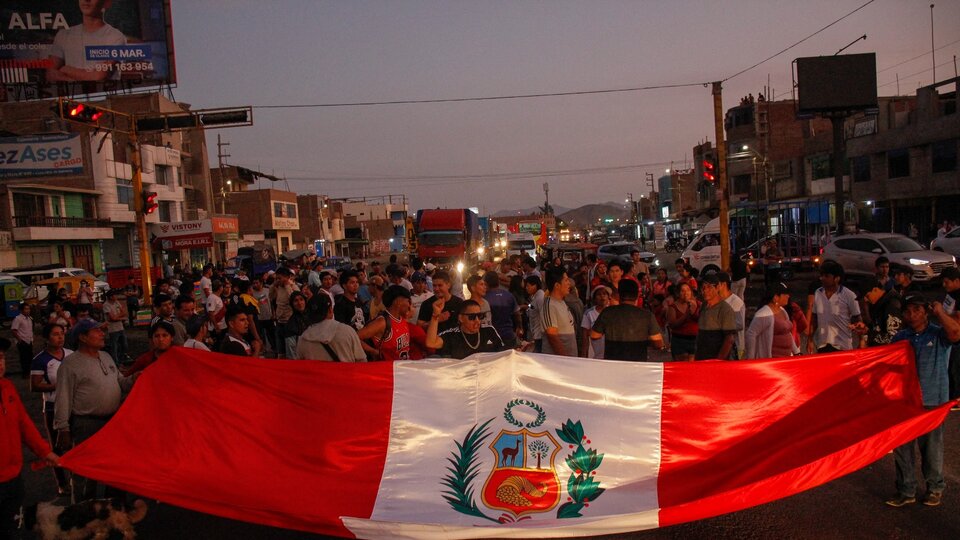Page/12 in Peru
From Lima
One day after Congress closed the session of the Legislature without approving the advancement of elections for this year, new protests took to the streets of Lima and other cities. At the close of this note, the repression against the protesters, who numbered thousands in the center of the capital, began. “Dina, murderer, how many more deaths for you to resign,” they chanted. Strong police cordons had closed streets and squares in the center to prevent a peaceful mobilization.
A recent ordinance by the mayor of Lima, Rafael López Aliaga, leader of the fascist Renovación Popular (RP) party, prohibits demonstrations in the center, which for weeks has been the scene of massive protests against the Government and Congress. Despite this prohibition that collides with the constitutional right to protest, thousands arrived on Saturday to demonstrate. This rule gives “legal cover” to police repression against peaceful protests, a constant since the protests began. A few days ago, López Aliaga met with President Dina Boluarte.
The mayor of the traditional district of Miraflores, another point of concentration for protesters, also from the RP party, has followed the same authoritarian path as the mayor of Lima. But just this Saturday a group of protesters arrived in this district, where there was a strong police presence. With these regulations that prohibit peaceful demonstrations, the aim is to demobilize the protests, which has not been achieved. In the last two months the repressive response has been permanent, including shots against demonstrators, which have killed 48 residents, most of them in Andean regions.
The right begins to maneuver to ensure impunity for human rights violations -murders, arbitrary detentions, torture- committed during the repression. The ultra-conservative Avanza País party has proposed an amnesty for police and military officers accused of shooting at the population. The far-right Renovación Popular calls for Peru to withdraw from the Inter-American Court of Human Rights to avoid prosecutions and sanctions. This offensive for impunity has been launched when national and international human rights organizations have condemned the repression, describing it as “crimes against international law” and “crimes against humanity”, and have demanded that those responsible for shooting and ordering the shooting , be judged.
The streets demand the advancement of the presidential and parliamentary elections, scheduled for 2026. But a majority -73 percent according to a recent survey- demands they be this year. In Congress, a sector of the right blocked that possibility. After in recent weeks four proposals to advance the elections did not reach the necessary votes, on Friday – the last day of the legislature session – a proposal was presented to revive that debate.
The left as a whole and some sectors of the right supported returning to debate and vote on the early elections. The far-right legislator and retired admiral Jorge Montoya requested a reconsideration of the vote that approved that proposal. The president of Congress, the retired general José Williams, another extreme right-wing soldier, instead of giving way to a second vote that would have ratified what had already been approved, boxed in Montoya’s request, leaving the issue of early elections frozen. General Williams closed the circle by surprisingly adjourning the session, without announcing its extension until February 28 – the next legislature begins on March 1 – to allow time for debate.
As it is a constitutional change, the early elections must be approved by two thirds of the chamber -87 votes- in two votes in the same chamber. If those votes are not reached, with the support of 66 legislators, that decision would have to be ratified in a referendum. In order for there to be time to organize the elections this year, it was necessary for the advance to be approved this month and ratified in a second vote in the next legislature in March. That will no longer be possible. If in the next legislature the advance of elections reaches 87 votes, it will have to wait until the next one, which begins at the end of July, for that vote to be ratified. With the matter postponed, time is running out for elections this year. Nor would it give in the event that it goes down the path of ratification in a referendum. In the best of cases, the elections could be in 2024. The alternative offered by the extreme right that opposes the early elections, is more repression to sustain this government.
The same day that the elections for this year were blocked, the plenary session of Congress declared Colombian President Gustavo Petro “persona non grata”, ratifying a decision of the Foreign Relations Commission. It was approved with 72 votes in favor, 29 against and 7 abstentions. Congress asked that he be barred from entering the country. The different right-wing groups closed ranks against Petro, whom some legislators called a “terrorist” because of his guerrilla past. Weeks ago, as part of its attacks on the region’s progressive governments and leaders, Congress declared former Bolivian President Evo Morales “persona non grata.”
A few days ago, Petro compared the formation of thousands of police in the center of Lima before marching to repress, with a Nazi parade. It was a threatening police staging that seemed to be organized by an admirer of fascism.
“I tell Mr. Petro to dedicate himself to governing Colombia, that its streets are also filling up with protests,” Boluarte declared this Saturday. He also complained against the Mexican president Manuel López Obrador, whom he claimed for not transferring to him the pro tempore presidency of the Pacific Alliance (Colombia, Chile, Mexico and Peru). AMLO said that he will not do it so as not to legitimize the Boluarte government. The Peruvian Foreign Ministry demanded that transfer take place and accused the Mexican president of “interference.” Boluarte’s government, also at odds with others in the region such as those of Argentina, Bolivia, Chile and Honduras, is increasingly isolated. Inside and outside of the country.
